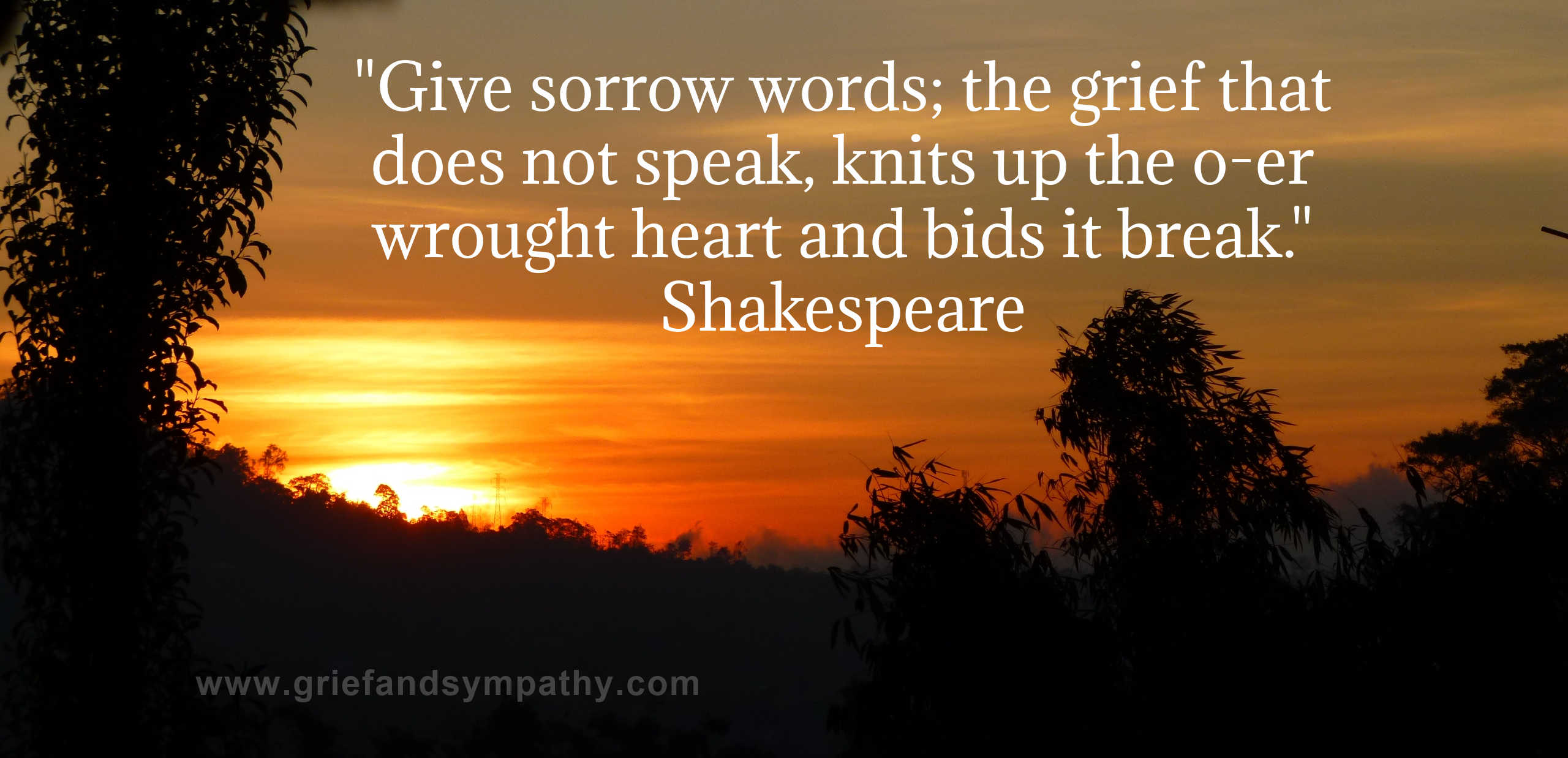Grief and Loss Journal Prompts
By Lesley Postle, Editor, GriefandSympathy.com, and Sue McDonald, psychotherapist and experienced grief journaler. Reviewed by Assoc. Attending Psychologist Wendy Lichtenthal.
Research has shown that keeping a journal for helping you with grief and your healing journey can be a valuable exercise.
If you’re wondering what a grief journal is, it can be anything you feel is right for you.
- It can take the form of a grief diary, so you can see how you are feeling over time and work out what makes you feel better and what triggers your grief.
- It could take the form of letters to and from your loved one.
- It might be just free-form flows of consciousness expressing your emotions.
- It could be your thoughts and reactions to a piece of writing such as a book about coping with grief, a poem or a quote.
- It might be a scrapbook with photos, letters, drawings, cards you received and any other memories you want to add.
We have described in our article about journaling through grief, how and why this activity can be beneficial to you. Here, we give you some grief and loss journal prompts to get you started.
Sue Mcdonald has added some further ideas of her own at the end based on her 20 years experience of writing her own grief journal. You can read her story here.
At the end, we share further resources to guide you on your way, including some guided grief journals that we have found to be useful.

7 Grief and Loss Journal Prompt Ideas
Scroll down for prompts in the following 7 categories:
1. Diary entries
2. Self-care ideas
3. Forming a continuing bond
4. Body and mind connection
5. Gratitude
6. Journaling in response to quotes or poems
7. Creativity
1. Diary Entries
- What challenges have I faced today?
- What did I learn from those challenges?
- What made me feel good today? (This can be as simple as a cup of tea or a hot shower, a chat with a friend, or even a good cry).
- What things am I willing to do tomorrow that I feel will help me to heal?
2. Self-Care Ideas
- Who do I feel that I can reach out to when I am in need?
- What support would I like to ask for specifically? Are there things which might be stopping me from doing that?
- How can I allow myself to feel like I deserve that support?
- Do I know anyone else who is grieving? How might I be able to help them?
- These are the things which might make me feel better . . .
- I promise myself that I will do the following because I deserve it . . .
- Make a list of things that make you happy, even if it’s hard to reach that happiness right now.
Check out our list of self-care ideas here.
3. Forming a Continuing Bond

One of the most important things in coming to terms with our grief is to be able to treasure the memories of those we have lost.
Often doing things in their honour, things they may have wanted to do but didn't, or re-visiting places you enjoyed together are ways to keep the relationship alive even when they are gone.
People often talk to a photo of their loved one, or write letters to them. The following are some journal prompts that will get you thinking about ways to keep your bond alive and keep your precious memories.
- My favourite memories of _______ are . . .
- We always wanted to do . . . . . together.
- I promise that I will do . . . to honour ________ and in his/her memory.
- I feel most connected to ______ when . . .
- If _______ were here right now, I think he/she would say . . . to me.
4. Body and Mind Connection
It's very common to feel grief in our bodies, especially if we have feelings that we haven't expressed or accepted. I know I had a really bad back pain for about 2 months when my Dad died and when my partner was diagnosed with cancer, I felt a lot of pain in my solar plexus for weeks. It was as if someone had punched me in the stomach.
These prompts may help you to work out what you are holding in your body and allow you to let it go.
- Where in my body am I feeling my grief . . .
- If I have a pain in my body, what is it telling me?
- What would I like to say back to the pain or discomfort in my body?
- What feelings would I like to have in the future?
- What feelings would I like to let go?
Practices such as yoga and meditation are really good ways of getting in touch with your body too. We have several pages on these in our self-care hub.
5. Gratitude
Gratitude is a wonderful practice which has been common to many religions and belief systems since ancient times. It can help to make you feel more positive about life.
- 3 things that I am grateful for about having had _______ in my life.
- I am grateful that I learned . . . from ______.
- I feel gratitude that I experienced the following . . .with ______ .
- I am grateful for these happy memories . . .
6. Journaling in response to quotes or poems
Sue tells us that "quotes can help to unblock and release thoughts and emotions".
Some of the questions we can ask ourselves about what we read:
- How does this writing make me feel?
- What does the writer mean by . . . ?
- Do I feel similar emotions to the writer or something different?
- How do I relate to what the writer has said?
- How does this quote/poem help me to find meaning in my grief?
- How can I bring what I’ve learned from this writing into my daily life?
Here are some pages of quotes or poems to get you started:
Unusual Quotes about Grief and Loss
21 Comforting Quotes about Death and Grief
7. Creativity
Connecting with our creative side can be helpful in expressing our feelings and finding meaning in our lives. Perhaps you feel drawn to writing a poem yourself about how you feel in your journal.
Expressive Arts therapist Irene Renzenbrink has been working with the bereaved for many years and has also used many of the techniques she teaches to help herself through her own bereavement.
You could try painting, collage, photography, sewing, music, and many more to express yourself. You don’t have to have any previous skills. I have been doing pottery and drawing recently, which I have never done before in my life, and it is really calming and therapeutic.
More Grief Journaling Prompt Ideas from Sue McDonald
Sue
McDonald, (BA, PGCE, Dip Couns, Cert
Couns, Dip Supervision), is
a retired psychotherapist and trainer, with expertise in developmental
disabilities, trauma and complex grief. She is an avid advocate of journal
writing, having kept her own journal for over 20 years.
"I encourage you to ask yourself, as well as answer other people’s questions, which can sometimes lead you away from your own inner guidance, and write/draw whatever is going on for you in the moment.
Just allow your hand to take the lead, and try not to let your head interfere, correct, or direct the process. This may be difficult at first, as you learn to trust your own process.
My Favourite Journal Prompts are:
- How am I feeling right now?
- What am I thinking?
- What is my body telling me?
- Are there any key words popping up?
- Do I have an image in my mind?
- What is on my mind right now?
- What do I need?
- Where in my body do I feel ..... tension, pain, anger, shame, joy, fear?
- What is my anger/sadness/fear telling me?
- How can I describe my relationship with..... parents, deceased person, friends, siblings, self?
- Are there any recurring themes?
Maybe begin with
- I feel........
- I think.........
- I want..........
- I need..........
- I do..........
- I am.........
- I see..........
- I hear........
- I sense........
- I wonder...........
- Once upon a time .......
Other ideas
- Writing letters....... to deceased person, to ourself, to parts of ourself. See more about writing letters here.
- Dialogue with others, or parts of self
- Draw/paint images
- Explore dreams
- Art....... draw pictures, images, painting, collage (you don’t have be a great artist)
- Writing stories, eg. Write your own fairytale
Related Read:
This is one of the best guided journals we have come across. Alternatively, check out the lovely journal notebooks at Etsy.

How to Carry What Can't Be Fixed, A Journal for Grief
Related Pages:
What Is a Grief Journal? - Sue McDonald shares her story of 20 years of grief journaling.
How to Do Grief Journaling for the Best Results
Not ready for grief journaling yet? Try some of our other self-care activities:
Yoga for Grief
Meditation for Grief
Activities to Get You Out and About
- Grief and Sympathy Home
- Self-Care
- Grief and Loss Journal Prompts
Where to get help:
Have You Considered One-on-One Online Grief Counseling?
Get Expert and Effective Help in the Comfort of Your Own Home
The following information about online counseling is sponsored by 'Betterhelp' but all the opinions are our own. To be upfront, we do receive a commission when you sign up with 'Betterhelp', but we have total faith in their expertise and would never recommend something we didn't completely approve.
Do you feel alone and sad with no support and no idea how to move forward? It can be tough when you are stuck in grief to find the motivation to get the most out of your precious life.
Online counseling can help by giving you that support so you don't feel so alone. You can have someone to talk to anytime you like, a kind and understanding person who will help you to find meaning in life again, to treasure the memories of your loved one without being overwhelmed and to enjoy your activities, family and friends again.
- Simply fill out the online questionnaire and you will be assigned the expert grief counselor most suitable for you. It only takes a few minutes and you don't even have to use your name.
- Pay an affordable FLAT FEE FOR UNLIMITED SESSIONS.
- Contact your counselor whenever you like by chat, messaging, video or phone.
- You can change counselor at any time if you wish.
- Click here to find out more and get started immediately.
- Or read more about how online counseling works here.
Sales from our pages result in a small commission to us which helps us to continue our work supporting the grieving.
Hypnosis for Grief - 10 Ways It Can Help You
Try a gentle hypnotherapy track to relax the mind. Learn how self-hypnosis can help you cope with grief at any time of the day or night.

For Remembrance:
Sales from our pages result in a small commission to us which helps us to continue our work supporting the grieving.
Memorial Jewelry to Honour a Loved One
Check out our lovely range of memorial jewelry for any lost loved one. Pendants, necklaces, rings or bracelets, we have them all in all kinds of styles. Choose for yourself or buy as a sympathy gift.
Create an Online Memorial Website
Honour your loved one with their own memorial website. Share photos, videos, memories and more with your family and friends in a permanent online website. Free for basic plan with no ads.








